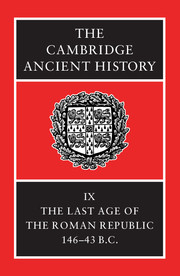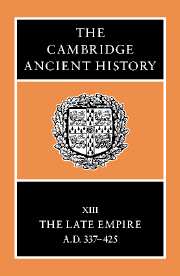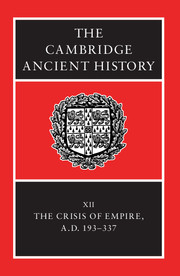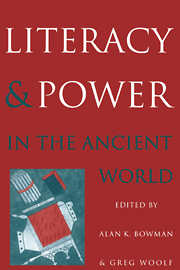The Cambridge Ancient History
The period described in Volume 10 of the second edition of The Cambridge Ancient History begins in the year after the death of Julius Caesar and ends in the year after the fall of Nero, the last of the Julio-Claudian emperors. Its main theme is the transformation of the political configuration of the state and the establishment of the Roman Empire. Chapters 1-6 supply a political narrative history of the period. In chapters 7-12 the institutions of government are described and analysed. Chapters 13–14 offer a survey of the Roman world in this period region by region, and chapters 15–21 deal with the most important social and cultural developments of the era (the city of Rome, the structure of society, art, literature, and law). Central to the period is the achievement of the first emperor, Augustus.
- A key volume of The Cambridge Ancient History, describing the principate of Augustus, one of the major periods of Roman history
- Volume 9 of The Cambridge Ancient History has sold 1,500 copies in the first 3 months
- The publication of Volume 10 brings the new edition down to AD 69
Reviews & endorsements
"The new volume X of the Cambridge Ancient History is an impressive accomplishment....the editors have done an admirable job. The overall standard of the contributions is good: anyone seeking an outline of the period who turns to this book will not be badly served." International History Review
"...the range and breadth of material covered will make this indispensable reading for ancient historians and students of Roman literature adn culture alike. The high level of quality throughout is what we have come to expect from this venerable series." Craige Champion, Classical World
"...this series is a basic "must" for all public and private libraries, in the community or in the universities. It will be the standard general work for serious academic students and scholars for the next generation." Religious Studies Review
Product details
April 1996Hardback
9780521264303
1090 pages
304 × 174 × 79 mm
2.08kg
21 maps 9 tables
Available
Table of Contents
- 1. The triumviral period Christopher Pelling
- 2. Political history, 30 BC to AD 14 J. A. Crook
- 3. Augustus: power, authority, achievement J. A. Crook
- 4. The expansion of the Empire under Augustus Erich S. Gruen
- 5. Tiberius to Nero T. E. J. Wiedemann
- 6. From Nero to Vespasian T. E. J. Wiedemann
- 7. The imperial court Andrew Wallace-Hadrill
- 8. The imperial finances D. W. Rathbone
- 9. The senate, senatorial and equestrian posts Richard J. A. Talbert
- 10. Provincial administration and taxation Alan K. Bowman
- 11. The army and the navy Lawrence Keppie
- 12. The administration of justice H. Galsterer
- 13a. Italy and Rome from Sulla to Augustus M. H. Crawford
- 13b. Sicily, Sardinia and Corsica R. J. A. Wilson
- 13c. Spain C. Alföldy
- 13d. Gaul C. Goudineau
- 13e. Britain 43 BC to AD 69 John Wacher
- 13f. Germany C. Rüger
- 13g. Raetia H. Wolff
- 13h. The Danubian and Balkan provinces J. J. Wilkes
- 13i. Roman Africa: Augustus to Vespasian C. R. Whittaker
- 13j. Cyrene Joyce Reynolds and J. A. Lloyd
- 14a. Greece (including Crete and Cyprus) and Asia Minor from 43 BC to AD 69 B. M. Levick
- 14b. Egypt Alan K. Bowman
- 14c. Syria David Kennedy
- 14d. Judaea Martin Goodman
- 15. Rome and its development under Augustus and his successors Nicholas Purcell
- 16. The place of religion: Rome in the early Empire S. R. F. Price
- 17. The origins and spread of Christianity G. W. Clarke
- 18. Social status and social legislation Susan Treggiari
- 19. Literature and society Gavin Townend
- 20. Roman art 43 BC to AD 69 Mario Torelli
- 21. Early classical private law Bruce W. Frier
- Appendices
- Stemmata
- Chronological table
- Bibliography.







